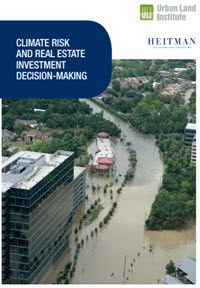The Real Estate Roundtable on June 9 commented on the unique challenges facing commercial real estate businesses if the Securities and Exchange Commission (SEC) eventually requires corporate issuers to report on climate-related financial risks. (See SEC’s 15 Questions for Consideration and The Roundtable’s responses)
- The SEC’s March 15 request for public comments is not unique to real estate, but seeks information from all corporate stakeholders on climate change reporting and metrics. “It’s time to move from the question of ‘if’ to the more difficult question of ‘how’ we obtain disclosure on climate,” said former Acting Chair Allison Herren Lee. (SEC speech, March 15)
- On May 6, the new SEC chair, Gary Gensler, testified before the House Financial Services Committee that he intends to propose new rules on corporate climate risk disclosures in the second half of 2021. (Reuters, May 6)
Roundtable Comments
- The Roundtable’s comments recommend a “principles-based” approach to corporate climate risk disclosures as opposed to a prescriptive “one size fits all” reporting standard. It coordinated closely with Nareit in developing its submission to the SEC.
- More specifically, The Roundtable’s comments provide:
- Energy consumption and associated emissions from any particular building or portfolio depend on a range of variables – such as a building’s age, location, asset-type, and tenant mix. The SEC should be flexible in developing reporting standards for companies that develop, own and operate income-producing real estate.
- The GHG metrics that building owners can most accurately measure and quantify arise from their direct and immediate operations of assets they manage and control on a day-to-day basis. Building owners should not be compelled to measure, quantify or report on indirect emissions that derive from off-site facilities, or the actions of tenants or other third-parties beyond the owner’s immediate control.
- The SEC should allow a marketplace of reporting frameworks to thrive, flourish, and evolve. No single reporting framework should be mandated.
House Legislation

- The House Financial Services Committee on May 12 advanced the Climate Risk Disclosure Act of 2021. The bill would direct the SEC to issue rules within two years that require public companies to disclose:
- Direct and indirect greenhouse gas emissions;
- Total amount of fossil-fuel related assets that it owns or manages;
- How its valuation would be affected if climate change continues at its current pace, and;
- Risk management strategies related to the physical risks and transition risks posed by the climate crisis.
- The House bill would also direct the SEC to tailor disclosure requirements to different industries. (JD Supra, May 17). The bill likely faces a more difficult path forward in the Senate.
Investment Industry Comments
- The Investment Company Institute (“ICI”), which represents firms including BlackRock, Vanguard and JPMorgan Chase, submitted comments to the SEC on June 4. ICI believes “using a combination of principles-based and prescriptive elements is particularly apt in the context of climate-related information.” (Reuters, June 8).
- While ICI recommends that companies within the SEC’s jurisdiction should report on “direct” emissions (“Scope 1”) and emissions due to electricity purchases (“Scope 2”), it does not believe that companies should be mandated to report on so-called indirect “Scope 3 emissions” at this time.
- PoliticoPro (June 7) reported that “ICI made the recommendations as investors increasingly demand that companies follow certain environmental, social and governance reporting standards so they can channel capital to green projects and workplaces that promote equity and inclusion.”
The Real Estate Roundtable’s Sustainability Policy Advisory Committee (SPAC) – which meets remotely on June 16 in conjunction with The Roundtable’s June 15 Annual Meeting – will continue to work with policymakers in Congress and the Administration on energy and climate issues of importance to commercial real estate.
# # #


